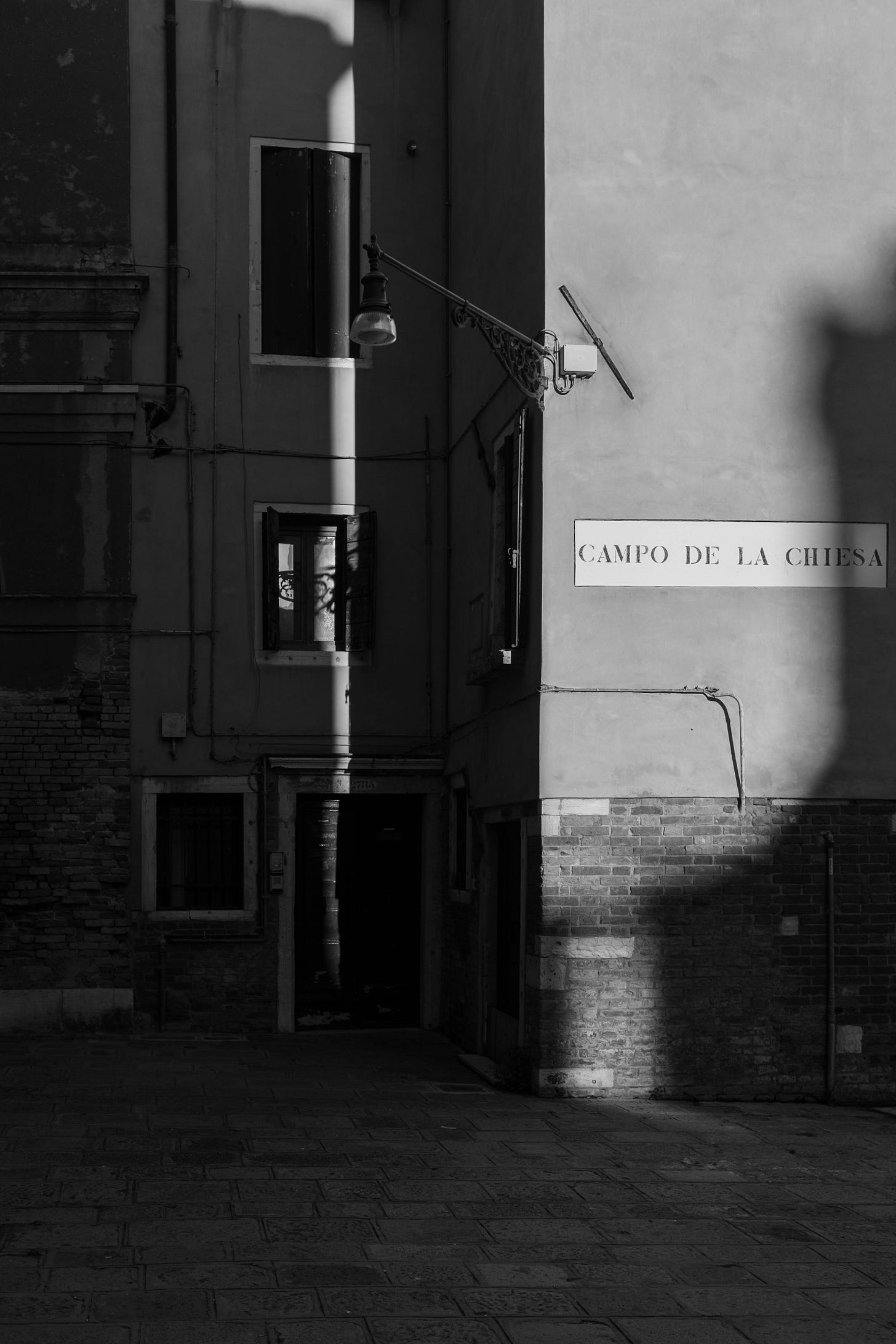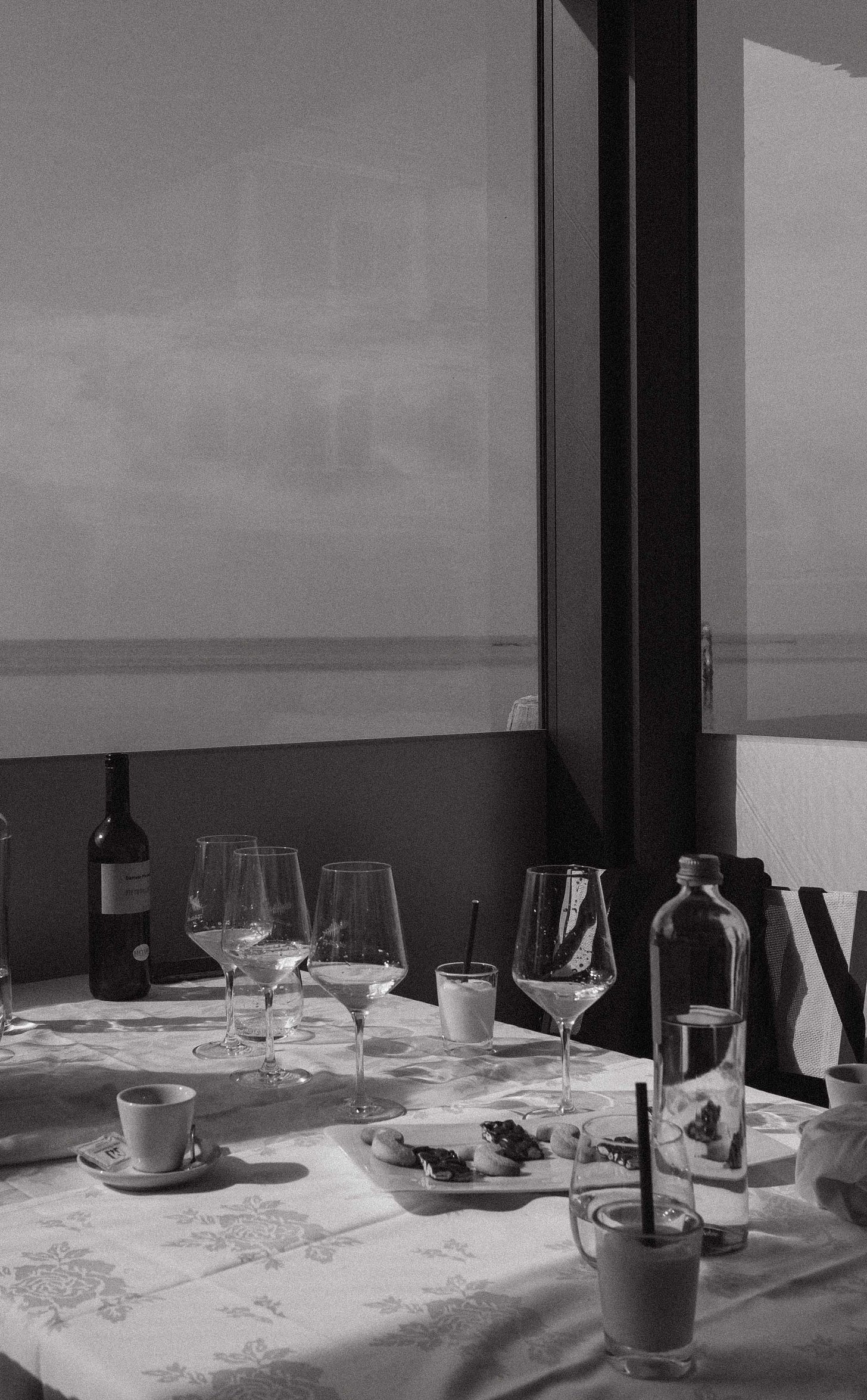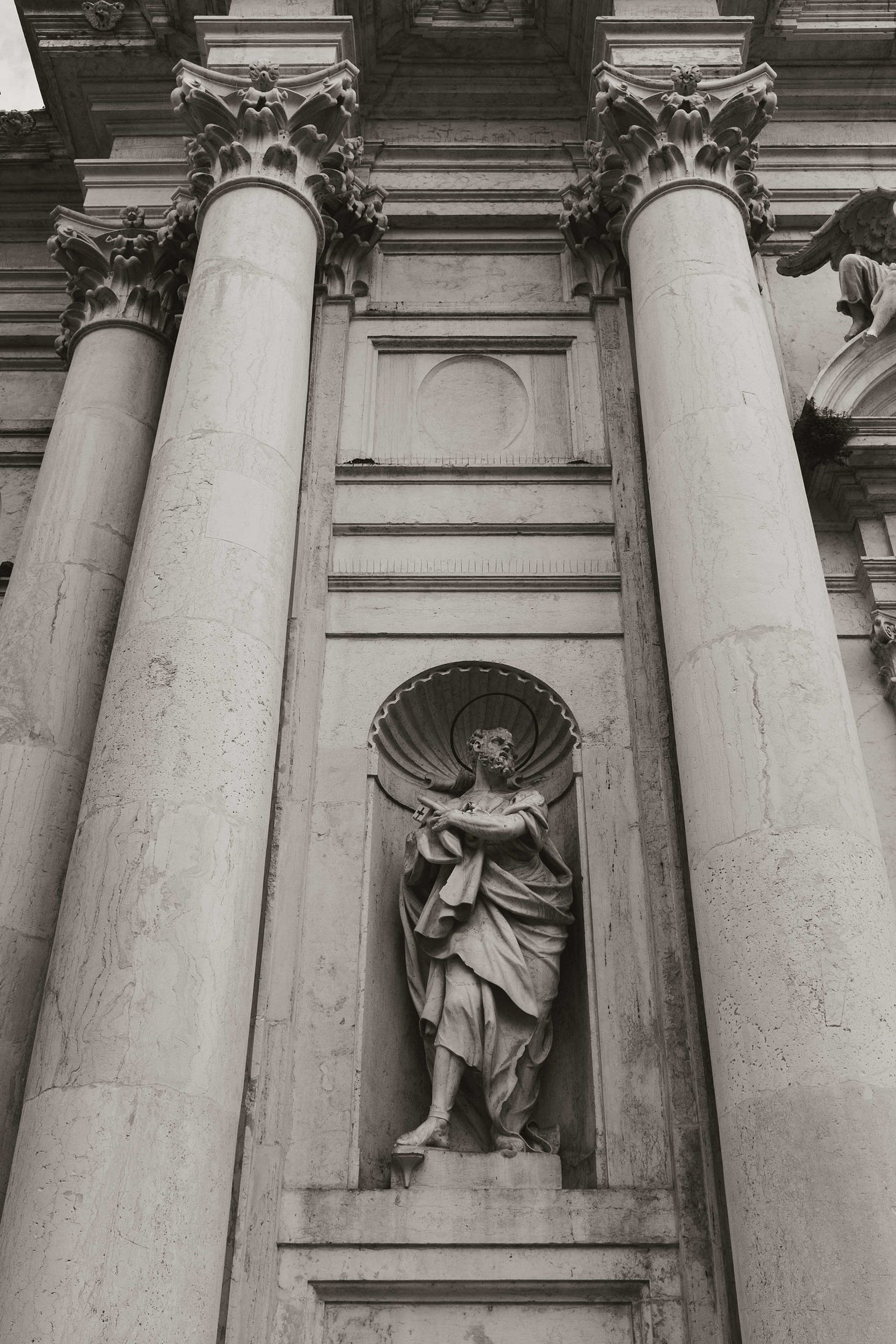The scaffolding went up sometime in early August. I arrived home one blistering evening, the light already beginning to retreat, and saw a pile of poles and boards stacked under the covered walkaway at the end of the calle. The following day, I returned to find one storey of shelves had been build along the perimetrical wall of the old, battered building where I live––36 square metres on the second floor. By the end of the week, the entire building had been enveloped in an iron-and-wood armour, all the way up and across the roof. I knew it was happening: the roof had to be completely redone, the torrential rainfalls of the previous springs delivering a finishing blow. New insulation was necessary, and we needed new gutters, too. I knew all this; the landlady had prepared me for it. We just didn’t know when it was going to happen.
And then it did.
I stood by the front door for a minute, trying to become acquainted with this imposing new presence and the changes it brought, not just to the way the light hit the surfaces, but to the energy of the street. All of a sudden, there was no laundry hanging from the wires of my neighbours downstairs, no scent of fabric softener, no fluttering sheets. People, prevaricated by the arrogance of the structure, had shut their windows and locked themselves in. It was the height of summer, and the air was silent, devoid of the domestic noises and bits of conversations that once filled it.
The whole structure remained menacingly quiet for two weeks. “What a waste of summer days, light, air, windows cracked open, and salubrity," I thought. “Very typical,” my architect friend told me. “They move scaffolding from one building site to the next. It’s likely they just parked it there before going on their summer break.” Meanwhile, my tiny apartment had started to feel even smaller, as if shrinking under the pressure of this bulky outer shell. Its double exposure––one of the things I loved about it––had been neutralised, and light or air struggled to come through. The walls, made of brick and stone with no insulation, absorbed heat without a chance to release it and turned the house into a cave, a furnace.
Then, at the end of August, the works started.
“I didn’t realise the noise would give me anxiety,” I told that same friend.
”It can be very invasive, I’m sure.”
”My entire morning routine––20 minutes of yoga, 20 minutes of reading, 20 minutes of silent focus––has gone down the gutter. It took me so long to find a rhythm, and now I wake up and there are voices and strangers walking back and forth outside my window. It disrupts the rest of my day.”
”Maybe wake up earlier?”
”I like working and writing at night so no one bothers me. I don’t go to sleep until 1 am, sometimes later. I’m not a morning person.”
”You realise that entire world, not just the builders, functions on a different schedule?”
”And that’s precisely the struggle.”
Construction continued through September, but I was hardly ever at home, save for a few bright, crisp mornings during which I nonetheless had to turn on the lights, cursing the entire universe. I know these to be infinitely small problems, stemming from a privileged state compared to the tremendous things happening in the world right now. I live with this understanding while still feeling a sense of discomfort, sitting with the duality of my experience, and breathing. Either way, the month progressed in fast-forward motion, as usual, with a relentless chase of work commitments wedged between social happenings, cultural events, and a series of exciting writing assignments. Short trips to Marche, Verona and the Langhe, for both business and leisure, were thrown in for good measure. It was all great fun, as long as I stayed on the merry-go-round. Very dizzying the moment I came down from it.
Venice in September is busy and beautiful. It’s like being high all the time. I’d like to think I thrive in busy environments, but the truth is that I feel on edge all the time, so I can’t keep going for long. I push through, but my introverted self hurts a little, and each time the recovery takes a little longer to complete. Incidentally, I haven’t written a single word for myself since I returned from my cammino. I used to beat myself up about it, and I still do to some extent, but I’ve realised that the self-criticism is linked to a performative exercise––as if I’m failing to deliver something and betraying someone’s expectations––while in fact, the whole point of writing for me is to appease. I feel good when I write, and if I’m not writing, it’s because something is a bit off in my life––maybe I’m not running on my own schedule, or maybe there is too much noise around me, and I can’t hear my own thoughts. I know this to be a shared experience for those who find pleasure and peace in putting words on the page––an ongoing compromise with life’s demands.
Halfway through September, soon after the end of the Venice Film Festival, the weather abruptly switched from hot and humid to cold and rainy. Unprepared, I spent a spare Saturday morning pulling out the long-sleeved sweaters and jackets from storage, and ironing and folding away the summer dresses. I bought a new umbrella, fully aware that I’d struggle to open it in crammed, narrow calli. So, I also bought a parka, which serves me better on most days. Not just that––propelled by the change of season and the change of clothing, and seeing how many key pieces my wardrobe was lacking, I ended up acquiring a few other items from two little vintage shops in Venice: a pied-de-poule wool blazer, two sweaters, and a whimsical pale-pink shirt with Nordic houses patchworked on the breast.
I also bought a watch from the monthly market in Campo San Maurizio: a tiny Omega De Ville with a thin black strap. The purchase had nothing to do with the season or with things I actually needed, and everything to do with a sense of impermanence, and with Gianni, the white-haired, kind man running the antique watches stall.
I approached the stall, drawn to a different watch––a small, round Certina, its size and elegance standing out among the larger, more masculine watches. I asked if I could try it on, and Gianni––he introduced himself then––said I could, apologising for the strap, which “didn’t do the watch any justice; it’s temporary. If you buy, please, change it.” I tried the watch, which felt diminutive on my small wrist. My only other watch was a regular size, and this one felt strange somehow. Still, I was evidently, instinctively looking for something different, something I could wear in the evening as a substitute for other wrist jewellery, which I neither owned nor wore.
Next to the Certina was a small, rectangular Omega from the Sixties, with a golden frame and a brown leather strap. The inside looked a bit opaque, but it was a beautiful object––more precious than the previous one I had inspected. “If you like that one, then wait, you’ll love this one,” Gianni said. He ducked under the stall to search for something and emerged with a leather case in his hand. He untied the strap and rolled it open to reveal another Omega, oval-shaped, in gold. It was perfect, without a scratch, shiny and heavy in my hand despite its size. He told me the price of both, and I knew I had to have the second. “Give me a deposit; I’ll get it cleaned and checked. I want to deliver it to you in perfect shape.” I gave him the little cash I had on me, we exchanged phone numbers, and off I went.
“Are you regretting it?” my mother asked me minutes later as we sat on the leafy patio of a new café just off the Accademia, having coffee. I must have looked pensive.
“It was a bit of an impulsive purchase, wasn’t it?”
“It’s beautiful, though. It’s an heirloom. You’ll have it forever.”
“I’ll pass it down to someone one day—I don’t know who, but someone. I don’t own anything like that, really. There’s nothing I can pass down. Not a house, not a piece of jewellery. I gave back my engagement ring because it was also an heirloom, and there was no reason for me to keep it. Not that it’s the role of objects to soothe our looming sense of mortality, but in a way, it is. I’ve been feeling like I live in impermanence.”
Gianni delivered the watch one week later, polished and impeccable. “Someone else saw it today,” he said. “I was showing them another watch in the same leather case. They wanted it, they even offered me more money for it, but I told them it was taken. So don’t regret it.” He showed me how to wind it and mentioned that the charge would last about 30 hours. I set the time to run a few minutes fast––a mental trick that helps with my chronic lateness.
“It doesn’t work if you know it!”
“It’s psychological. I don’t know why it works, but it does.”
“You’re always late anyway.”
“That’s because I check the time on my phone, and that’s the worst thing I could do. I get distracted and end up even later.”
I arrived home that day to find my bedroom window nailed shut with a piece of plywood, and debris scattered on the floor just below it. I phoned the geometra supervising the work.
“It’s to protect the window glass while we remove the old plaster and prepare the walls for the new treatment,” he explained.
“It already feels oppressive as it is,” I replied. “Could you please let me know how long it’s going to stay on, and if it could be removed at the weekend, or any time it’s not strictly needed?”
“Sure thing.”
The plywood came off ten minutes later; they’d left it there out of convenience, not considering how it would feel from the inside. I thought about the cost of enduring this in a home I don’t own—a home I like very much, that has often felt like a refuge, a safe space, something to protect and that protects me in return. But still, it’s not my home. It’s an impermanent place, one where I don’t dare do much to change anything.
“I’d love to buy it.”
“It’s so tiny, though. Think about it. It might suit you now, but your needs could change. In a way, they’re already changing.”
“My ideal relationship is same city, two houses. It’s true that I’ve given up something I used to love doing—having house parties and dinners. A party of three isn’t really a party.”
“So think about it.”
“It’s not even for sale, really. And it’ll probably appreciate in value once all the work is done. I might not be able to afford it.”
“Hence the watch?”
“Hence the watch. Less upkeep, too. And if I change my mind, which I often do, I can sell it easier.”
”You won’t.”








👋🏻 from a fellow night owl and resident in the impermanence (both Venetian building construction and existential)
Such a lovely piece to read Valeria! Could we see a photo of your timepiece please? 🥰